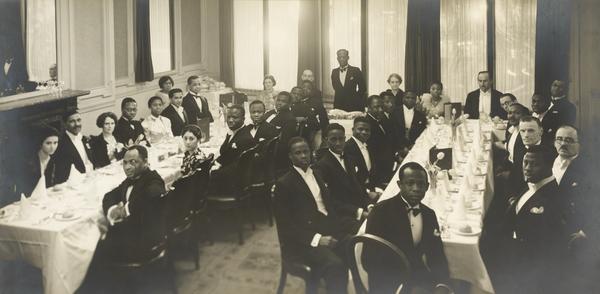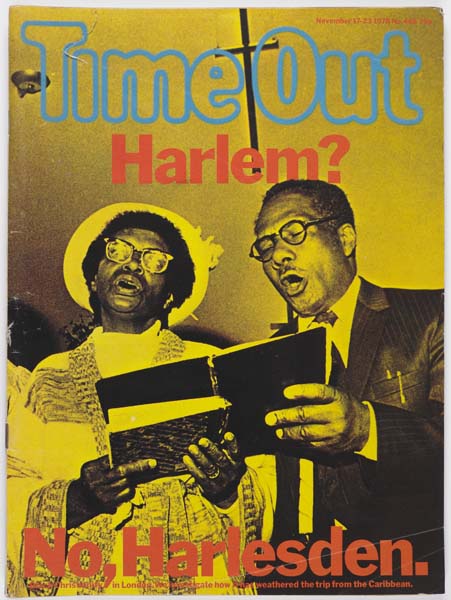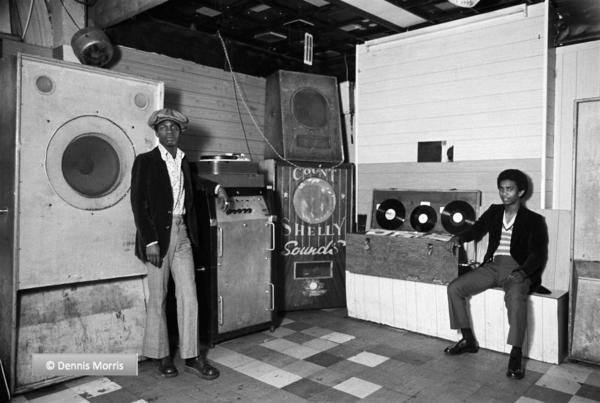07 March 2024 — By Juliet Fletcher
East London & the popularity of gospel choirs
Gospel choirs were relatively unheard of in the UK until the late 1960s. Now we see them perform with icons like Elton John and Madonna.
Music and faith are often ways for people to come together, and gospel choirs have done exactly that for over a century in the UK. You might have seen gospel choirs perform on TV, or the radio, or whether you realise it or not, they are often seen accompanying A-list singers such as Elton John. The London Community Gospel Choir performed with John at his last gig at Glastonbury in 2023. The famous Sister Act movies and musicals also celebrate the power and popularity of gospel choirs. Songs like ‘Amazing Grace’ and ‘Oh Happy Day’ are gospel songs that have swept across global music charts.
Yet, this is not a genre of music that is very well documented in the UK.
For many decades, gospel music has been a major influence on almost every popular genre – blues, jazz, soul, country, rock, pop and even grime. So, how did this music form, which did not originate in Britain, become so influential? And how have the choirs in London’s East End contributed to its growth?
“It wasn’t until the late 1960s that gospel choirs gained popularity and recognition in the UK”
The Jubilee Singers, Queen Victoria and Windrush
The gospel music that's now popular in the UK originated from the American southern states and the Caribbean slave plantations. The 17-century European hymns were mixed with their work songs, which also formed a key feature of the later African-American freedom movement. In the UK, one of the earliest and well-recorded performance by a gospel choir was by the Fisk Jubilee Singers, who performed for Queen Victoria and Prime Minister William Gladstone in 1873.
However, it wasn’t until the late 1960s that gospel choirs gained popularity and recognition. In fact, the history of gospel music in the UK is deeply tied to the Windrush generation from the Caribbean. They brought a Caribbean-style that heavily influenced British gospel. From 1948 to 1978, these Commonwealth citizens responded to the call to rebuild war-torn Britain. East London had suffered greatly from the Blitz and was one of the popular areas where these communities settled and worked.
Amidst the challenges of post-war Britain, Caribbean people were influenced by Britain’s social, economic and political situation, which creatively helped Black gospel music makers form a sound that has become distinct from its US counterpart.
Emergence of gospel choirs in east London
Places like Hackney, Dalston, Mile End and Walthamstow have long had diverse communities. A majority of immigrants brought with them their strong religious faith and cultural way of life – particularly in Christian church worship.
Sadly, many were not received into traditional local churches – primarily, not solely, because of prejudices and racism. This led to the emergence of independent, Black Majority Churches and gospel choirs. Choirs were central to the format of a worship service: supplementing congregational singing and providing special song selections. Initially, the style was a cappella, ie, without instrumental accompaniment, except the occasional tambourines, banjos/ukulele and accordions. Later, piano or organ was incorporated, and these days, the choirs perform with a rhythm band (keyboards, bass and lead guitar and drums). Some of the UK’s well-known musicians and choir leaders of British gospel music came out of these east London churches, specifically in Dalston, Clapton, Leytonstone and Walthamstow.
Soon small, ‘front room’ church meeting groups became large fellowships, making way for the Black church movement in Britain. The power of a choral and music community was the heartbeat of the first descendants of the Windrush generation. Through music, they found identity, stability and purpose in faith. The strength of the songs reinforced their self-worth, encouraging each other to aspire and achieve great heights. From choirs that brought the community together, several went on to become household names in the UK, both as performers but also as mentors.
We look at four such gospel choirs.
“Kids raised singing gospel have become lead singers in genres such as soul, blues, rap and grime”
East End’s iconic gospel choirs
The New Jerusalem Choir was one of the earliest local gospel choirs in east London, starting during the late 1960s. It started in what is now known as the Wood Street Tabernacle COGIC (Church Of God In Christ) in Walthamstow, a historical music church. They were popular amongst their own congregations, but also sang in local elderly people’s homes and events. Performances normally included a five- or six-piece band, and at its height, 30 voices! Although individual members of the choir became pioneering contributors to the British gospel scene, today the vocal ensemble operates a small choral group in the local fellowship.
The Latter Rain Outpouring Revival Choir was based in Dalston. This 1970s choir was first directed by the famous Rev Bazil Meade, who co-founded the London Community Gospel Choir (now known as “Britain’s most celebrated choir”) in 1982 alongside his mentee Lawrence Johnson. The latter garnered a reputation for training, coaching and arranging vocals for singers in the pop industry, such as multi-award winning grime and rap star Stormzy.
The Latter Rain Outpouring Revival Choir sang for large evangelistic meetings with international preachers. They developed a level of excellence and choral tone that others sought to emulate. Hundreds would attend their events, and the church base became a crucial hub for a thriving five-piece band with 30-50 singers.
Interestingly, in the late 1970s, these two East End choirs collaborated to participate in the first ever ticket-paying concert for gospel choirs in Leytonstone in Britain.
The renowned London Community Gospel Choir (LCGC) began in Leyton, east London, at the home of Rev Bazil Meade. In the 1980s, they became widely recognised after appearing on TV broadcaster Trevor Philips’ ground-breaking Channel 4 show ‘Black on Black’. Now headquartered in Waltham Forest, it’s a hive of activity with its own offices and recording facilities. The choir has several teams for different events, and is in high demand as back-up singers to pop stars ranging from Kylie Minogue to Madonna. It’s often referred to as “Britain’s first renowned contemporary performance touring, inspirational gospel choir band”.
The East London Gospel Choir (ELGC) was a 1990s choir based out of a Seventh Day Adventist Community of Singers, started by Leroy Thompson and Joseph Roberts from east London. They became very popular in the 90s after a number of celebrity appearances for operatic lyric tenor Luciano Pavarotti, also performing on pop star Sting’s hit single ‘Let Your Soul Be Your Pilot’. While they don’t perform as much, their contribution to gospel music and the industry overall has been significant.
The wide influence of gospel choirs
From the mid-20th century, gospel choirs have been vital to keeping Christian communities – especially the Windrush generation – together. And as we’ve seen, some of the choirs still stand more than 50 years on.
In fact, choirs such as the LCGC and ELGC have shown how gospel music and gospel choirs have expanded exponentially. They have gone from church and community congregations to not only bringing gospel music onto popular stage, but becoming sought-after back-up singers for pop icons. Kids raised singing gospel have become lead singers in genres such as soul, blues, rap and even intrinsically East End music like grime.
I have attempted to present a snapshot history of gospel choirs in east London. This is where many Caribbean immigrants first settled and formed choirs when traditional UK churches excluded them. Much more work remains to document the rich gospel music history here. But it's clear these groups have kept faith and culture thriving through generations.
Juliet Fletcher is Founder, Gospel Music Industry Alliance (GMIA), is a governing body for the Gospel Music Community across the UK and Ireland. GMIA promotes UK Gospel music as derived from the African, American and Caribbean musical experience relating to the Christian faith.



![Jubilee Singers, Fisk University, Nashville, Tenn. [American Missionary Association]; James Wallace Black (American, 1825 - 1896); about 1870; Albumen silver print; 84.XC.979.2075; No Copyright - United States (http://rightsstatements.org/vocab/NoC-U](https://media.londonmuseum.org.uk/images/WagtailSource-Jubilee-Singers-Fi.width-1136.format-webp.webp)













